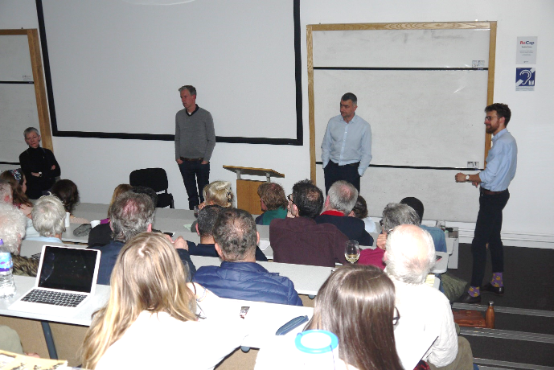The Iraq Invasion 15 Years On
The Iraq invasion 15 years on: consequences and lessons.
Monday 30th April, Newcastle University.
Co-hosted by the Martin Luther King Peace Committee, Newcastle University's Power/Space/Politics research cluster in Geography, and Newcastle Stop the War. 80 people were present.
The event was held to mark 15 years since the invasion of Iraq, an event which has had enormous consequences for both Iraq and the wider Middle East, and also politics and society in the UK. This event considered some of these consequences and asked how we can do UK politics and international relations better. Such a question is a fitting challenge to us in the year we mark 50 years since Martin Luther King visited Newcastle to receive an honorary degree - and gave his life for the cause of peace.
Nick Megoran, of STW/Newcastle University/MLKPC introduced the evening. He said that in March 2003, on the eve of the US invasion of Iraq, a group of Iraqi nuns wrote a harrowing open letter to Americans. "Every day we thank God for being alive because we do not know what tomorrow has hidden for us", they said. "The nightmare of the new war is haunting us always and everywhere", they continued, imploring their American brothers and sisters not to compound their suffering by launching another attack on their homeland.

Their calls went unheeded; and on March 20th 2003 the US-led forces (which included minor Polish and Australian units and a large British contingent) launched an invasion of Iraq, ostensibly to disarm its weapons of mass destruction. No such weapons were found - Iraq had largely complied with UN demands to disarm - but the aftermath was disastrous. In Iraq, it unleashed an ethnic/sectarian civil war, an anti-occupation uprising, and eventually the rise of the Islamic State group from the rubble of invasion and occupation. Close to home, the invasion acted as a recruitment boost for Al-Qaeda, unleashing terror on British streets in retaliation.
This event marked this grim anniversary by asking what the consequences of the invasion were, and how we can learn from it. It was chaired by Jackie Leach Scully of Newcastle University.
Craig Jones, of Newcastle University, spoke about how lethal drone warfare in Iraq has killed innocents, despite claims of technological accuracy. War lawyers justified this killing.
Chris Nineham, of Stop the War, who had a role organising the 2003 anti-war demos in London, spoke of how public reactions to the illegal, immoral and disastrous war had increasingly led the British public to adopt anti-war positions. The best way to avoid repeating the mistakes of Iraq/Libya again would be to work for an anti-war government, which has come within our grasp with a Labour Party led by Jeremy Corbyn.
James Megoran, Director for Rapid Response, Archbishop of Canterbury’s Reconciliation Ministry, Lambeth Palace, spoke of the pressure that Christians and other religious communities in Iraq have come under since the invasion, and the work that the Anglican Communion and others are doing to mediate and to work with other faith communities in Iraq and elsewhere to promote peace and dialogue.